#craig rodwell
Explore tagged Tumblr posts
Text



Insist that they love you: Craig Rodwell and the fight for Gay Pride
John Van Hoesen has published a new biography of Craig Rodwell.
Here is the introduction:
On November 12, 1969, Craig Rodwell, Ellen Broidy, and Fred Sargeant were picketing the Time-Life Building in New York. I was a teenager growing up on a dairy farm in rural Vermont, and their world was as far from mine as one could imagine. Most of the time when we weren’t in school, we were feeding cows, fixing fences, or storing the hay crop.
But even though we were far away from the skyscrapers and urban life, there was something we had in common that fall – the October 31 issue of Time magazine. It hit the newsstands in New York and the activists took to the streets; it landed next to the butter dish on our kitchen table, and I read every word. After examining six unflattering stereotypes and including a sidebar on whether homosexuals were sick, Time’s cover story concluded in its next-to-last sentence that “homosexuality is a serious and sometimes crippling maladjustment....” Just four months after the Stonewall riots, where Craig Rodwell’s rallying cry of “Gay Power” gave voice to a growing outrage against oppression, New Yorkers were incensed. It’s fair to say that most gay American teenagers had little awareness that this fight was occurring on their behalf. It was hard to fathom; in those years, the words queer and faggot were daggers thrust from behind that would stiffen the backs of uncertain teenage boys.
Rodwell had already opened his ground-breaking Oscar Wilde Memorial Bookshop in New York, the first bookstore dedicated solely to gay and lesbian literature. Ellen Broidy was a friend and volunteer. Fred Sargeant was Rodwell’s lover, manager of the shop, and vice chair of Rodwell’s Homophile Youth Movement in Neighborhoods. The three of them, along with Broidy’s partner, Linda Rhodes, would develop the concept and proposal for the first Pride march in 1970, one year after Stonewall. Rodwell was one of the most militant activists of this shining moment in the 1960s and ’70s. He worked to obliterate what he called “heterosexism” and to fulfill his purpose: that gay men and women could be themselves, stand up for themselves, and live a proud life. His contribution to the movement for gay rights was wide and deep, organizational and individual. He could be tender, warm, and focused, or stubborn and angry.
His life was a struggle. The drama started early as he was cast into foster homes, reform school, and the precocious life of a teenager plying the streets of Chicago. He knew before most of us that he had a calling, and he headed for New York and the Mattachine Society. He fell in love and then into despair, but the movement kept him going until what was something of a bittersweet end.
By chance, I came to know of Rodwell more than twenty years after he had opened the Oscar Wilde Memorial Bookshop, after I met Fred Sargeant, who would become my own life partner. I never met Craig; he had become ill by the time I was learning the magnitude of his contribution. But he left behind a half-dozen oral histories and recorded interviews and a trove of papers at the New York Public Library that became central to the research for this book.
From 1970 to 1973, Rodwell wrote twenty-one articles and editorials for QQ Magazine, which had a national readership in the tens of thousands. There’s no way to measure the influence Rodwell exercised, as he walked readers through a growing consciousness of gay freedom, but it had to have been enormous. The QQ articles are included at the end of this biography because they articulate in Craig’s own words the arc of gay liberation for the movement and for himself. I have for the most part used the language of the times. It’s an imperfect transposition to substitute different words for homophile and homosexual, which had a certain meaning in the ’50s, ’60s, and ’70s. When gay and lesbian are used, they are not meant to be exclusionary, but rather an accurate depiction of how people thought and spoke at the time.
Rodwell himself always capitalized the words Gay and Lesbian, and if he used the word Gay by itself he intended it to be an umbrella for women and men. His colleagues and friends knew him as a fierce feminist and inclusive employer long before diversity, equity, and inclusion became a part of professional vocabulary. Some of the language in Rodwell’s own articles is jarring today, but it reflects the culture and vocabulary of more than fifty years ago. I have also tried to reconcile various published discrepancies in the timeline of Rodwell’s life through research of primary source documents, newspaper accounts, public records, interviews, and the published record.
Rodwell never saw himself as a leader, yet his activism broke ground for thousands to lead an open and respected gay life. Today there are millions of marchers across the globe who stand up for themselves every year in parades that were first launched on June 28, 1970. Rodwell showed that it takes fortitude and courage to be open, to use your real name, and to insist on respect for your community. Many people were responsible for important advances in gay liberation, but no one bridged the phases of the movement quite like Rodwell. As Ellen Broidy reflected in my interview with her in 2022, “Craig was not a reformist in the Mattachine mold; then again, he was not a revolutionary. He was revolutionary, but not in the GLF [Gay Liberation Front] mold. He would have stood there by himself; he was fearless.” And Toby Marotta, in his 1981 book, The Politics of Homosexuality, called Rodwell “the first eastern homophile leader to act like a gay liberationist.”
When one examines Rodwell’s impact on gay liberation across his life, it’s hard to conclude that there was someone who did more to holistically draw the movement together. Where other pioneers of the time may have focused on institutional reforms, Rodwell focused on cultural inequities. He pushed the limits of the old guard at the Mattachine Society of New York, he drew in younger members, he walked the first picket lines, and he put his name and his face out in the public eye. In the fight for freedom, he took action into his own hands, and he wanted to make it easier for others to do the same. Through the Oscar Wilde Memorial Bookshop, he hoped to open minds, realize possibilities, and establish dignity for the community. His daring move to open a streetfront location with a plate-glass window, complete with a Gay Is Good sign, was an example of his insistent belief that one had to take on prejudice openly.
At the Stonewall riots, when he shouted out a call for “Gay Power,” the first response was quiet and tentative giddiness. So he shouted again. When we look back on the main events of gay liberation, Rodwell was not only present, but his fingerprints were all over the cause. This book is not an effort to position him as the sole leader of the movement or to displace the recognition of others. It is meant to establish the fact that Rodwell’s life is a missing link in our history – and perhaps more than others, with his fearless determination, he was a unique conscience of gay liberation. Freedoms are never fully secured, as history shows. The commitment and sacrifices that early leaders like Rodwell made are enduring examples of the fortitude it takes for those freedoms to be attained.
More Craig Rodwell (including audio) at the Making Gay History website.
#Craig Rodwell#Biography#John Van Hoesen#Gay history#Gay politics#Gay liberation#Making Gay History project
4 notes
·
View notes
Text



A bit early in my Oregon time zone, but in many places in the world it's already 28 June 2024, the 55th anniversary of the Stonewall Rebellion.
HAPPY PRIDE to all my QUILTBAG siblings and niblings and elders!
To counter some misinformation spread by transphobes, some helpful URLS
What Stonewall means to the people who were there
Gay rights pioneer & AIDS activist Yvonne Ritter shares personal experience in Stonewall Riots who is the third from left in Fred McDarrah's photo of gay youths at Stonewall -- and is an out and proud trans woman
Audio interviews on the first Christopher Street Day taken by Breck Ardery (2 sides)
Guardian article on the 50th anniversary of the Stonewall Rebellion
Village Voice onthe 40th anniversary
The Atlantic about Craig Rodwell's Oscar Wilde Bookshop
Interview with Craig Rodwell on Making Gay History
NPS's Virtual Fence Exhibit
Some of Fred McDarrah's Pride Photos, ccn( first page) and NY1.com (second page )
1999 article on Stonewall orig published in Socialism Today
Portrait of Craig Rodwell and Pride
Christopher Park Stonewall National Monument article: https://www.nyclgbtsites.org/site/christopher-park/ (And nothing about Fred Sargggghgent bc I find it reprehensible that he waited until Craig Rodwell was dead to start stealing Craig's thunder. Plus, you know, literal cop)
#Stonewall Rebellion#Happy Pride!#QUILTBAG#Yvonne Ritter#Breck Ardery#Bettye Lane#the Stonewall cross-dressing lesbian#Christopher Street#Stonewall Riot#Craig Rodwell#Oscar Wilde Bookshop#Making Gay History#Fred McDarrah#Stonewall#Gay History#Queer History#Trans History
13 notes
·
View notes
Text
Tragedy someone made a really good point but they got a detail wrong and are now accidentally spreading misinformation
#this could be about so many things but this was prompted by a post about the Annual Reminder#that made a really good point about the ineffectiveness of respectability politics#which is a really good criticism of the Annual Reminder and Mattachine in general#but they said the Annual Reminder was to remind people that gay people were just like everyone else#when no the Annual Reminder was held on the 4th of July to remind Americans that not all Americans enjoyed the same freedom#also the Annual Reminder was Craig Rodwell's idea and he was against respectability politics#but he didn't have a lot of power at Mattachine#in fact they had a falling out over it#when Craig organised Christopher Street Liberation Day it didn't have the same respectability codes Mattachine insisted upon
9 notes
·
View notes
Text

Gay is Good - Craig Rodwell, founder, Oscar Wilde Memorial Bookstore, New York, October 1969
Photography by Fred W. McDarrah
310 notes
·
View notes
Text


“The nights of Friday, June 27, 1969 and Saturday, June 28, 1969 will go down in history as the first time that thousands of Homosexual men and women went out into the streets to protest the intolerable situation which has existed in New York City for many years…” —Flier written by activist Craig Rodwell, 29 June 1969
Today marks 55 years since the famous Stonewall riots, which began with a police raid on the Stonewall Inn, an illegal gay bar in Greenwich, New York.
Influenced by a shift in the gay rights movement to a focus on pride rather than assimilation, queer patrons fought back violently, and continued to riot on subsequent nights.
One year on from the Stonewall riots, queer New Yorkers celebrated Christopher Street Liberation Day, an event which has transformed into the Pride marches we now see worldwide.
Learn more with our podcast on Stonewall!
#stonewall#pride#stonewall riots#pride month#queer history#gay pride#lgbt history#lgbtq#lgbt#queer#gay
358 notes
·
View notes
Text
The Oscar Wilde Memorial Bookshop

Craig Rodwell (1940-1993), an active member of the Mattachine Society of New York, suggested that Mattachine open a bookstore that would also have offices and space for community meetings. When Mattachine rejected this idea, Rodwell decided to do it himself, despite the fact that he had no experience running a bookstore. At the age of 26, Rodwell rented a very public storefront on Mercer Street near Waverly Place. The shop was named after Oscar Wilde, who, Rodwell wrote, was “the first homosexual in modern times to defend publicly the homosexual way of life, is a martyr to what has recently become known as the ‘homophile movement.’” The shop stocked books and periodicals that dealt with gay and lesbian issues in a positive manner; Rodwell refused to sell hardcore pornography, in part because of the Mafia-controlled distributors of this content, but he did carry softcore male physique magazines. Rodwell saw the bookstore as a community bulletin board, carrying announcements of important activities, as a clearing house for those interested in law reform in New York State, and as a spur to writers who would now have a place to sell their gay-themed work. On his letterhead and on the store window, he called Oscar Wilde “A Bookshop of the Homophile Movement.” He modeled the store after the Christian Science reading rooms he had grown up with, which sought to impart a positive image of the world.

Craig Rodwell at the Oscar Wilde Memorial Bookshop in 1971
The Oscar Wilde Memorial Bookshop had its grand opening weekend on November 18-19, 1967, becoming the first gay and lesbian bookstore to operate on the East Coast. It was preceded by Adonis Bookstore, in San Francisco, which opened several months earlier, in March 1967. However, after a couple of years, Adonis evolved into a gay adult bookstore, which made Oscar Wilde the first of its kind in the United States to operate long term. At first, Oscar Wilde only offered a limited number of publications for sale and Rodwell had to spread books out so that the shelves would appear full. His first year was a rough one – vandals broke in three times. But eventually, the shelves were filled with more and more LGBT-related publications. A public presence was crucial to Rodwell’s vision for the store: its front window was adorned with slogans such as “Gay is Good” and “Gay Power.”

Bookshop staff in 1977
People who worked here included Ellen Broidy, who was then a student at NYU and the first president of its Student Homophile League, as well as a member of other LGBT activist groups. The Mercer Street store also became the headquarters for the Homophile Youth Movement, where Rodwell often counseled young gay men and women and tried to set a positive example for them, so, as he said, they would “gain a sense of pride and dignity as young homosexuals.” In 1973, Rodwell decided to open a second store on Christopher Street, close to the center of gay life in New York and also called the Oscar Wilde Memorial Bookshop. He kept the Mercer Street store open for several months, for “sentimental reasons,” but finally closed it in May 1974. (Full article)
#andrew s. dolkart#history#gay history#lgbt history#lgbtq history#literature#lit#gay literature#lgbt literature#lgbtq literature#gay#lgbt#lgbtq#lgbtqia#60s#70s#1960s#1970s
62 notes
·
View notes
Text

Fred W. McDarrah, Untitled (Craig Rodwell, gay rights activist and founder of the Oscar Wilde Memorial Bookshop), New York, October 14, 1969
169 notes
·
View notes
Text
You are cordially invited to remember.....


Source 'The First Celebration' blog
#Christopher Street liberation day#Gay Liberation Front#1970#55 years ago today#Craig Rodwell#He dreamed big....
3 notes
·
View notes
Text
THIS DAY IN GAY HISTORY
based on: The White Crane Institute's 'Gay Wisdom', Gay Birthdays, Gay For Today, Famous GLBT, glbt-Gay Encylopedia, Today in Gay History, Wikipedia, and more … October 31
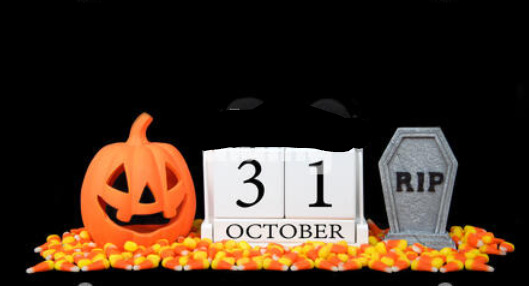


Hall🎃ween !
This "in between time" has long been one which gay people have taken on as their own holiday, reveling in masks and costumes. There are reasons Halloween is so closely associated with gay people, some of which author, Arthur Evans explained in his book, Witchcraft and The Gay Counterculture.Here is a brief excerpt:
One Celtic male deity … is the horned god, "one of the most basic of the Celtic god types," whose worship goes back to the Stone Age. He is often associated with the Mothers, as well as with sex, animals, and nature. He also seems to have links with male shamans. His great antiquity is shown by a Stone Age painting in Ariege, France, which shows a man dancing in the hide of an animal and wearing the antlers of a stag. And in the eighteenth century, construction workers inside Notre Dame Cathedral in Paris uncovered a four-sided Celtic stone altar dating from Roman times and bearing the figure of a bearded male deity with antlers. The stone was inscribed with the word Cernunnos, which means "The Horned One." The horned god was especially linked with male sexuality and often appears with an erect cock. Moreover, when erect, he is sometimes portrayed in the company of men, not women. A drawing of the horned god from Val Camonica, Italy, shows him holding a ceremonial collar ring in one hand and a horned serpent in the other. He is being worshipped by a man, and the man has an erection. This picture is reminiscent of early art scattered throughout Europe. The men often have erections and appear together in groups without women. In view of the Celts' notoriety for homosexuality, these facts suggest a Gay element in the worship of the horned god. The horned god was also lord of the dead and the underworld. To the Celts, who believed in reincarnation, darkness and death were parts of the cycle of life and rebirth, and death was the very place where the creative forces of nature brought about new life. Because of this connection with the underworld the horned god was often shown as black in color. But this blackness was not considered evil, as Christianity later viewed it.... The Celts dated the feast days of their religion according to the changing of the seasons, the breeding habits of animals, and the sowing and harvesting of crops. As it happens, these dates correspond exactly with the holidays later attributed by medieval Christians to witches. The Christians called these days, respectively, Halloween, Candlemas, Walpurgisnacht, and Lammas. Ritual transvestism associated with the old holidays continue[s] in Europe down to modern times. "May Day sports perpetuated the practices, including even transvestism. in Wales, there existed, into the nineteenth century, a peasant dance and march with a garland, led by a dancer [a horned god figure] called the "Cadi." In the Hogmanay celebration in Scotland, "the boys wore skirts and bonnets, the girls, hats and greatcoats." The feast of Fools, a remnant of the old pagan religion, has persisted into modern times with clerics "wearing masks and monstrous visages at the hours of the office. They dance in the choir dressed as women, or disreputable men, or minstrels. They sing wanton songs." Today many Gay people throughout Europe and America observe Halloween as a Gay holiday with transvestite celebrations.

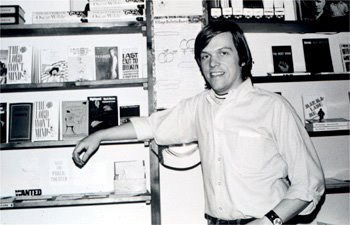
1940 – Craig L. Rodwell (d.1993) was an American gay rights activist known for founding the Oscar Wilde Memorial Bookshop on November 24, 1967, the first U.S. bookstore devoted to gay and lesbian authors, and as the prime mover for the creation of the New York City pride demonstration. Rodwell is considered by some to be the leading gay rights activist in the early homophile movement of the 1960s.
Rodwell was born in Chicago, IL. His parents divorced prior to his first birthday and for the next few years he was boarded out for day care where he was required to do kitchen labor and laundry to supplement his board and care. When he was 6 years old, Rodwell's mother, Marion Kastman, fearing that the child care set up could cause her to lose custody of her son, arranged for his admission to the Christian Scientist affiliated Chicago Junior School for "problem" boys, in Elgin, IL. Conditions and treatment at the school were described as "Dickensian" and Rodwell got a reputation for being a rebellious child, as well as a "sissy," during his seven years there. It was at Chicago Junior School that Rodwell first experienced same-sex relationships and also came to internalize the Christian Scientist notion that "truth is power and that truth is the greatest good."
At Sullivan High School in Chicago, IL. Rodwell continued his studies in Christian Science by enrolling in Sunday school at the 16th Church of Christ, Scientist. He later studied ballet in Boston before finally moving to New York City in 1958. It was in New York that he first volunteered for a gay rights organization, The Mattachine Society of New York.
In 1962, Rodwell had an affair with Harvey Milk, who went on later to become one of the first openly gay politicians elected to high office. It was Rodwell's first serious relationship. Rodwell's relationship with Milk ended in part due to Milk's conflicted reaction to Rodwell's early activism and his introduction to Milk of "strange new ideas that tied homosexuality to politics, ideas that both repelled and attracted the thirty-two-year-old Milk." Milk believed that Rodwell had been responsible for Milk contracting an STD. After Rodwell's arrest and incarceration when picked up cruising in Washington Square Park, Milk ended their romantic involvement. Shortly after, Rodwell attempted suicide.
When Rodwell opened the Oscar Wilde Memorial Bookshop in 1967, Milk dropped by frequently, and after moving to San Francisco Milk expressed his intention to Rodwell of opening a similar store "as a way of getting involved in community work." Milk eventually opened a camera store that also functioned as a community center, much like Rodwell's bookshop had as a community gathering place.
In November 1969, Rodwell proposed the first gay pride parade to be held in New York City along with his partner Fred Sargeant, Ellen Broidy and Linda Rhodes. The first march was organized from Rodwell's apartment on Bleecker Street.
We propose that a demonstration be held annually on the last Saturday in June in New York City to commemorate the 1969 spontaneous demonstrations on Christopher Street and this demonstration be called CHRISTOPHER STREET LIBERATION DAY. No dress or age regulations shall be made for this demonstration. We also propose that we contact Homophile organizations throughout the country and suggest that they hold parallel demonstrations on that day. We propose a nationwide show of support.
Rodwell is believed to have created the term heterosexism in January 1971 when he wrote:
"After a few years of this kind of 'liberated' existence such people become oblivious and completely unseeing of straight predjudice and - to coin a phrase - the 'hetero-sexism' surrounding them virtually 24 hours a day.
In 1978 Rodwell was one of the creators and organizers of Gay People in Christian Science. One reason for the creation of the group was that three of its members had been recently excommunicated from the local branch church. In 1980 the group began to demonstrate by leafletting at the church's Annual Meeting in Boston and by 1999, six years after Rodwell's death, the Christian Scientist church no longer barred openly gay or lesbian people from membership.
Rodwell died on June 18, 1993 of stomach cancer.

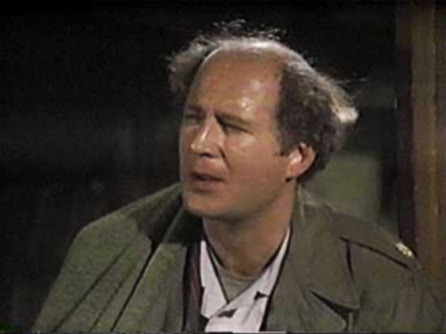
1942 – David Ogden Stiers is an American actor, director, vocal actor, and musician, noted for his roles in Disney films, the television series M*A*S*H as Major Charles Emerson Winchester III and the science fiction drama The Dead Zone as Reverend Gene Purdy. He is also known for the role of District Attorney Michael Reston in the Perry Mason TV movies.
Ogden Stiers joined the cast of "M*A*S*H" in 1977 as the arrogant but charming aristocrat Charles Emerson Winchester III. In addition to starring in the sitcom, he voiced the characters of a number of Disney movies, including Cogsworth in "Beauty and the Beast" and the Archdeacon in "The Hunchback of Notre Dame."
Stiers is also the associate conductor for the Newport Symphony Orchestra and the Ernest Bloch Music Festival. He has guest conducted over 70 orchestras around the world, including the Oregon Mozart Players, the Vancouver Symphony, the Oregon Chamber Players, the Yaquina (Ore.) Chamber Orchestra, as well as orchestras in San Francisco, San Diego, Los Angeles, Chicago and Toronto.
In 2009, Stiers announced to the world that he is gay and "very proud to be so." The actor said he kept his homosexuality under wraps for years because he feared coming out would hurt his career. Butas he has not experienced any anti-gay discrimination in the movie industry recently, Ogden Stiers is reconsidering what exactly made him stay in the closet for so long.

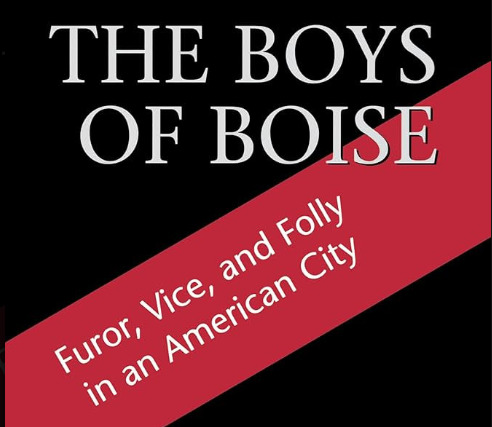
1955 – The "Boys of Boise" affair begins. Starting with the arrest of four men for sexual relations with male teenagers who are prostitutes, it is blown into a situation in which Boise is called a mecca where Gay men can find boys. Begun by a group of right-wing politicians to shake the moderate political establishment, the issue is inflamed by the Idaho Daily Statesman and Time magazine. As a result of the hysteria, a city councilman is defeated for reelection and a West Point cadet from Idaho is dismissed. A 1965 investigation reveals the incident to be based on outright lies.

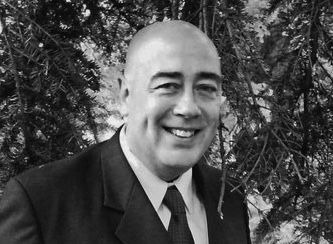
1956 – Bruce Bawer, born in New York City, is an American writer who has been a resident of Norway since 1999. He is a literary, film, and cultural critic and poet who has also written about gay rights, Christianity, and Islam.
Bawer's writings on literature, gay issues, and Islam have all been highly controversial. While championing such authors such as William Keepers Maxwell, Flannery O'Connor, and Guy Davenport, he has criticized such authors as Norman Mailer and E.L. Doctorow. A member of the New Formalists, a group of poets who promoted the use of traditional forms, he has assailed such poets as Allen Ginsberg for what he views as their lack of polish and technique.
Bawer was one of the first gay activists to seriously propose same-sex marriage, notably in his 1993 book A Place at the Table, and his 2006 book While Europe Slept was one of the first to skeptically examine the rise of Islam in the Western world.
On an episode of the Charlie Rose Show marking the 25th anniversary of the Stonewall Riots, Bawer took part in a discussion with fellow gay moderate Andrew Sullivan and gay-left writers Tony Kushner and Donna Minkowitz. Minkowitz underlined the conflict between the two sides of the gay-rights movement by saying: "We don't want a place at the table! We want to turn the table over!
A Washington Post article about the 25th anniversary of Stonewall quoted Bawer on gay pride marches: "It's hard to make straight people understand how serious an issue gay rights is when they look and see a kind of Mardi Gras atmosphere … It doesn't communicate the idea that these are serious issues."
From 1994 to 1999, he was a regular columnist for The Advocate, the gay newsmagazine. His Advocate columns and other articles by Bawer on gay issues were later collected in an e-book, The Marrying Kind.

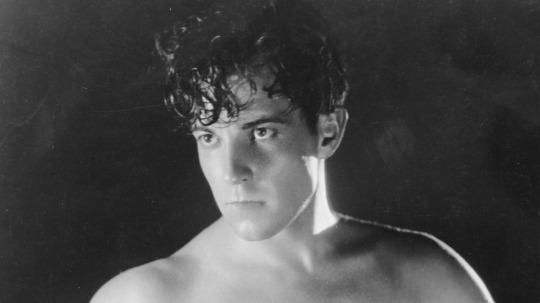
1968 – Silent film star Ramon Novarro was found murdered. A bathroom mirror had the words "US GIRLS ARE BETTER THAN FAGGITS" smeared in blood. Hustler Paul Ferguson and his brother Tom Ferguson were convicted of the murder and both received life sentences. During the trial, Novarro's sexual orientation was called into question with more vigor than the guilt or innocence of the defendants.

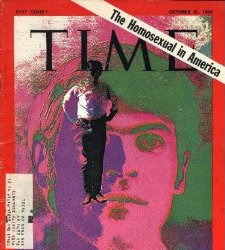
1969 – On this date Time magazine ran a cover story on "The Homosexual in America" that included a report on the Stonewall Riots. It was protested by the Gay Liberation Front because the writer said homosexuals are mentally ill and immoral.

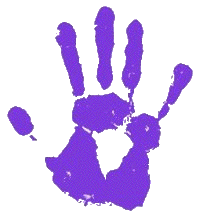
1969 – On this night sixty members of the Gay Liberation Front (GLF) and the Society for Individual Rights (SIR) staged a protest at San Francisco's Examiner in response to another in a series of news articles disparaging LGBT people in San Francisco's Gay bars and clubs. The peaceful protest against the "homophobic editorial policies" of the Examiner turned tumultuous and were later called "Bloody Friday of the Purple Hand".
Examiner employees "dumped a bag of printers' ink from the third story window of the newspaper building onto the crowd." Some reports were that it was a barrel of ink poured from the roof of the building. The protestors "used the ink to scrawl "Gay Power" and other slogans on the building walls" and stamp purple hand prints "throughout downtown San Francisco" resulting in "one of the most visible demonstrations of Gay power".
According to Larry Little John, then president of SIR, "At that point, the tactical squad arrived — not to get the employees who dumped the ink, but to arrest the demonstrators who were the victims. The police could have surrounded the Examiner building...but, no, they went after the Gays...Somebody could have been hurt if that ink had gotten into their eyes, but the police came racing in with their clubs swinging, knocking people to the ground. It was unbelievable." The accounts of police brutality include women being thrown to the ground and protesters' teeth being knocked out.

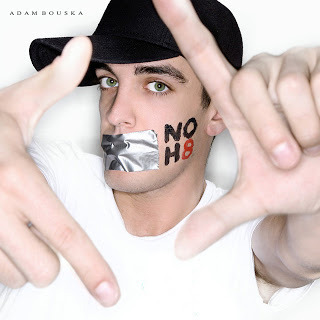
1983 – Adam Bouska, born in Decatur, Illinois, is an award winning American fashion photographer who runs a photography studio based out of West Hollywood, California. He is known for pictures of male models in particular, and is considered a rising 'superstar photographer' in the gay community. His work has been printed in DNA Magazine and reFRESH and has already been featured on a variety of shows and mediums including The New York Times, Life & Style magazine, Guinness Book of World Records 2010, Chelsea Lately, TODAY show, The View, Million Dollar Listing, Millionaire Matchmaker, and CNBC. He is also noted for his work with celebrities such as Barry Manilow.
Bouska is openly gay. He lives in West Hollywood, California and was recognized as the community's leading photographer at the West Hollywood awards in January 2007.
In November 2008, in response to the narrow approval in California of Proposition 8, which banned gay marriage, Bouska and his partner, Jeff Parshley, founded the NOH8 Campaign to promote the overturn of this ban. While beginning at a grassroots level, by April 2009 the campaign had seen support from many celebrities and became involved in the Miss USA 2009 controversy. The campaign has now gained the support of many notables.
NOH8 is a photographic silent protest launched on February 1, 2009 in direct response to the passage of Proposition 8 in California. Photos feature subjects against a white background with duct tape over their mouths, symbolizing their voices being silenced by Prop 8 and similar legislation around the world, with NOH8 painted on one cheek in protest.
Three years since its inception, the NOH8 Campaign (pronounced No Hate) has grown to over 20,000 faces and continues to grow at an exponential rate. The campaign began with portraits of everyday Californians from all walks of life and soon rose to include politicians, military personnel, newlyweds, law enforcement, artists, celebrities, and many more. Perhaps two of the most famous NOH8 models have been Cindy McCain, wife of U.S. Senator John McCain (Arizona), and daughter Meghan McCain.

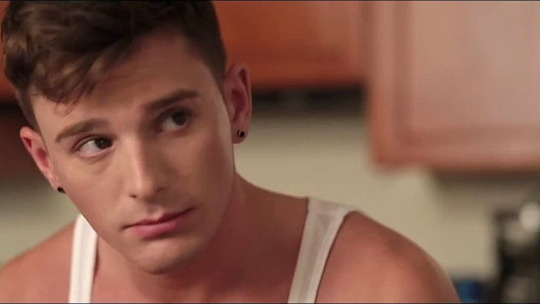
1986 – Sean Paul Lockhart, born in Lewiston, Idaho, is an American model, film actor and gay pornographic actor. For the latter, he uses his stage name Brent Corrigan and has played roles in gay porn films notably with Cobra Video and Pink Bird Media, but has also made some films with Active Duty and Jet Set Men. As for his appearances with Falcon Studios particularly in The Velvet Mafia series, he has used the stage name Fox Rider instead.
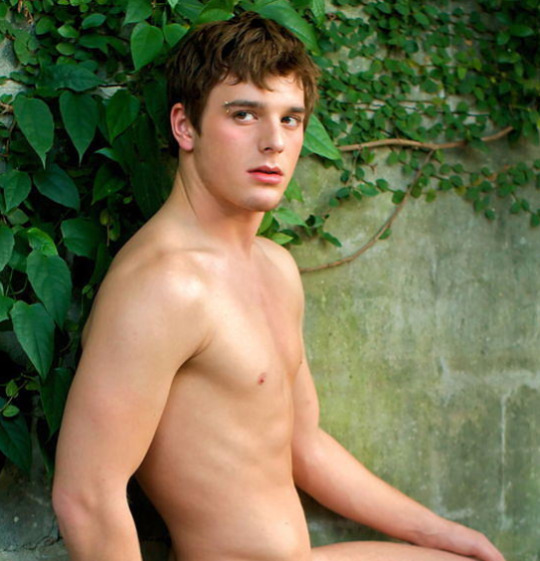
As Brent Corrigan/Fox Rider
He has also appeared in several nonpornographic films as well, using his birth name Sean Paul Lockhart trying to reposition himself as a more serious mainstream actor rather than just a porn star and has released no new pornographic films since 2010 . He has focused almost exclusively on gay-themed movies and indie films. Such gay-themed and indie films include Judas Kiss, Sister Mary, Another Gay Sequel: Gays Gone Wild!, Welcome to New York, and others.
In 2011 he starred as "Ricky" in the musical Chillerama directed by Tim Sullivan in the segment "I Was A Teenage Werebear".
In 2011 Sean Paul Lockhart won the Rising Star Award at the Philadelphia QFest Festival. In 2012, he announced his involvement in production of an indie film titled Truth to be directed by Rob Moretti. He has also recorded an album with songs by the Swedish singer-songwriter and accordionist Roland Cedermark. Lockhart heads up his own production company and enjoys writing in his spare time.
Both Lockhart and Cobra Video the gay porn company that launched him as a young porn star have created separate "official Brent Corrigan websites" promoting the performer's gay porn films creating some confusion and controversy.
Lockhart's admission of playing pornographic roles while underage created great controversy resulting in voluntary withdrawal of many of his early films from circulation.
He also appeared as a witness in the murder trial of Bryan Kocis, owner of Cobra Video for whom Lockhart worked. Prosecutors alleged the two accused suspects murdered Kocis because they wanted to get Lockhart to work for them at their porn film company. However, police investigating the murder believe Lockhart didn't know about the plot and that he fully cooperated with the police and testified for the prosecution.

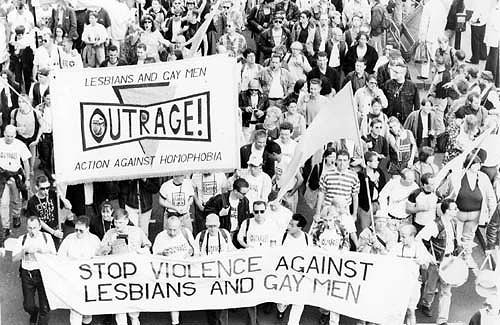
1992 – On this date the coalition for Lesbian and Gay Rights held a march in London. The event was a follow-up to EuroPride 1992.
One marcher recalls: I was particularly gratified on my journey down to watch some Metropolitan Police officers turning a blind eye to a group of gay men "kicking shit" out of a group of youths who had chanted "Batty Boys" at them in Brixton.


5 notes
·
View notes
Text
Hi, just wanted to pop in and say (from my admittedly limited knowledge) that while it has been contested the extent to which trans people were involved in the original Stonewall riot, trans people were absolutely there.
Marsha P. Johnson, a trans rights activist, was there, as confirmed by Craig Rodwell (a major player in starting the first Pride march), when she “climb[ed] to the top of a lamppost and drop[ped] a bag containing a heavy object on the [cop] car’s windshield, shattering it.” (David Carter, Stonewall: The Riots That Sparked the Gay Revolution). According to Seymour Pine, the officer who led the raid, “We had a couple of the transvestites who gave us a lot of flak” (David Carter, Stonewall: The Riots that Sparked the Gay Revolution). According to Pine, one of their goals was to embarrass and harass the trans women at the Stonewall Inn. Them giving the cops “flak” was the start of unrest.
In other words, erasing trans people from Stonewall is a blatant erasure of history. We should not stand for this. Trans people have ALWAYS been part of the gay rights movement, and we shouldn’t let the gay people who would deny that forget that we are the line standing between them and the people who would just as eagerly take gay rights away as trans rights.
The first Pride was a riot, and trans people have always been in that fight.

Not to be dramatic but this is a massive fucking deal and I legitimately hope every single politician dies.
46K notes
·
View notes
Text

Gay is Good - Craig Rodwell, founder, Oscar Wilde Memorial Bookstore, New York, October 1969
Photography by Fred W. McDarrah
97 notes
·
View notes
Text
Tudo o que você precisa saber sobre a edição Paris Photo 2023
by Ivica Mamedy Sem título (Craig Rodwell, ativista dos direitos dos homossexuais e fundador da livraria Oscar Wilde Memorial), Nova York, 14 de outubro de 1969 Amantes da fotografia, guardem a data! De 9 a 12 de novembro, a maior feira internacional de arte dedicada ao meio fotográfico que se realiza em Paris está de volta ao Grand Palais Éphémère. Desde 1997, a Feira Paris Photo tem a missão…

View On WordPress
0 notes
Text
Press Release from the Oscar Wilde memorial bookshop
This is archived material that is available online here. I have attached the document as a photograph so that it is more accesible to people who want to stay on tumblr. I have not done an image description for fatigue related reasons.

Today we have many places that house queer collections, but Craig Rodwell in his founding of his bookshop did a wonderful thing for queer accessibility to our own history. If you like this, there are many online queer libraries, and I would encourage you to ask your local library where their LGBT collection is!
#queer#queer history#gay#gay history#lgbt#lgbt history#type: media#trans#trans history#nyc collection#the fatigue related reasons are also why this is not a fully sourced and normal post
1 note
·
View note
Text

“Every record has been destroyed or falsified, every book rewritten, every picture has been repainted, every statue and street building has been renamed, every date has been altered. And the process is continuing day by day and minute by minute. History has stopped. Nothing exists except an endless present in which the Party is always right.” ― George Orwell, 1984
Malcolm:
Did not start the Stonewall revolt. There was no one event, but an accumulation of episodes of harassment including multiple arrests (such as Stormé DeLarverie) and strip-searches, which built up into an unleashed mob revolt.
Was not even there when the Stonewall revolt began. He himself says he arrived at about 2am and the fighting and the fire were already well underway.
Was not "trans." he describes himself as a "boy" and a drag queen.
If you're wondering, the religious parallel is the Crucifixion. It's ahistorical, there's no evidence it happened, but it's pushed, as an article of faith, as being "true" in order to fabricate a "debt" owed and an obligation by others to repay that mythical debt.
New York's pride was organized by Craig Rodwell, Fred Sargeant, Ellen Broidy, and Linda Rhodes. Michaels had nothing to do with it.
It's interesting that the Dems' official account believes that gay men and women were not organizing and advocating for their own interests and rights until a drugged out, homeless, prostitute and pedophile pimp drag queen came along. That's what they think the legacy of gay rights and its core values are about.
#Fred Sargeant#Malcolm Michaels#Marsha P. Johnson#Marsha P Johnson#drag#drag queen#gay erasure#Stonewall#Stonewall riots#pride#gay pride#pride march#historical revisionism#religion is a mental illness
28 notes
·
View notes
Text

BING
16 notes
·
View notes
Text


Stonewall by Martin Duberman, 1993, pages 84-85
#gay#lgbtq#queer#lgbt#lgbt pride#lgbtqplus#lgbt history#queer community#queer history#gay history#lgbtq history#lgbtqiia+#lgbt books#lgbtq community#gay men#drag queen#martin duberman#craig rodwell#1960s#1960s history
3 notes
·
View notes